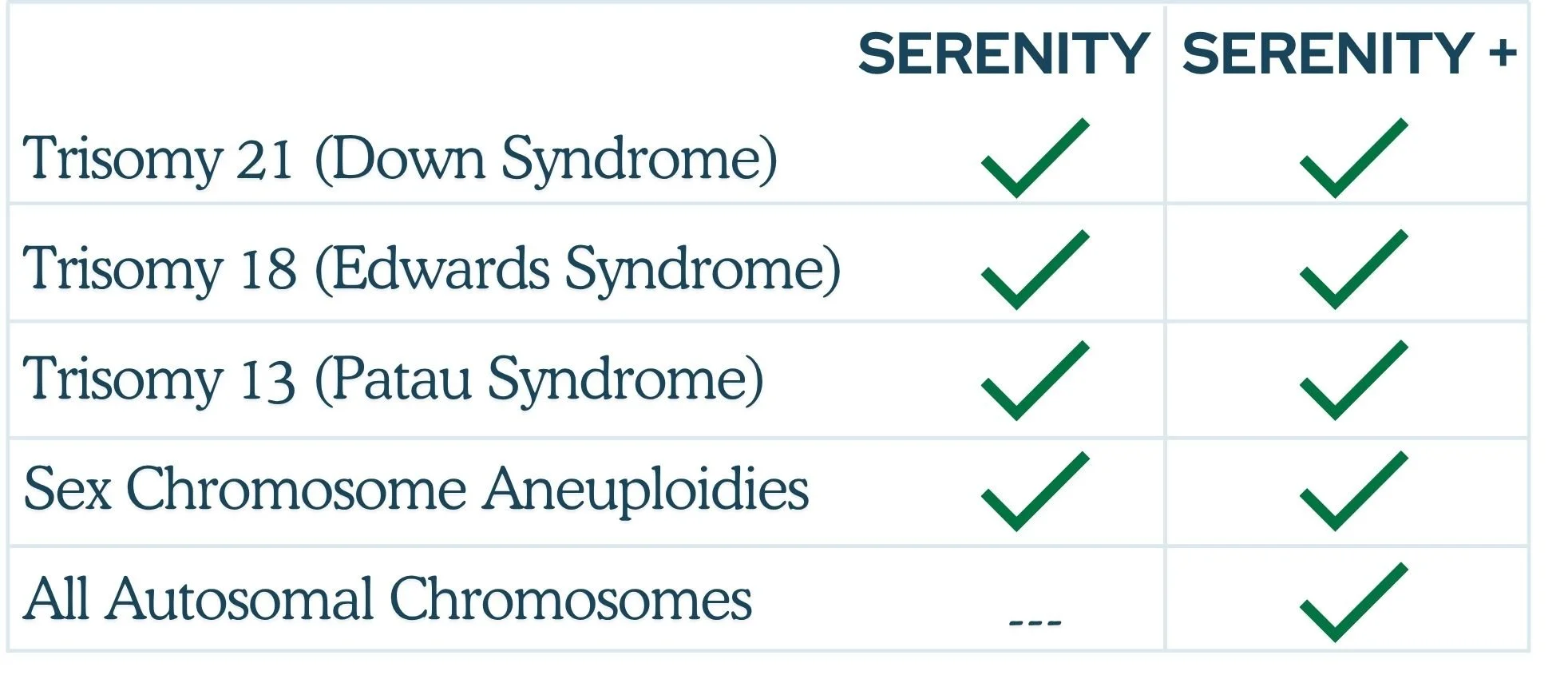SERENITY
Every Heartbeat Matters
Proudly Canadian
Serenity, a Non-Invasive Prenatal Test (NIPT), is a simple step toward understanding your baby’s health.
Clarity in Your Pregnancy Journey
With Serenity NIPT
Test As Early as 10 Weeks
Screen for Genetic Risks
Prenatal Insights for All Pregnancies
Reliable Results without Risk to Your Baby
99.7%
Accuracy
Serenity non-invasively, i.e. with a simple blood draw, analyzes “cell-free” DNA fragments to assess the risk of common chromosomal abnormalities in the baby with 99.7% accuracy.
DNA from the unborn child passes from the placenta into the mother’s blood and can be examined for chromosomal disorders using Serenity. The proportion of cell-free DNA in the amount of free DNA in the mother’s blood is on average approximately 10%.
What is Cell-Free DNA?
Explore Serenity
-
Non-invasive Prenatal testing (NIPT) for aneuploidies (abnormalities) in 5 chromosomes (21, 18, 13 and XY)
Trisomy 21 (Down Syndrome)
Trisomy 18 (Edwards Syndrome)
Trisomy 13 (Patau Syndrome)
Sex chromosome aneuploidies (XY)
-
Non-invasive Prenatal testing (NIPT) for aneuploidies (abnormalities) in all chromosomes
Trisomy 21 (Down Syndrome)
Trisomy 18 (Edwards Syndrome)
Trisomy 13 (Patau Syndrome)
Sex chromosome aneuploidies (XY)
All Autosomal Chromosomes
Microdeletions are chromosomal disorders caused by small missing pieces of chromosome material. Many microdeletion syndromes can cause serious health issues including both physical and intellectual impairment. The capabilities of the Serenity have been expanded to help detect 5 specific microdeletion regions:
1p36 deletion
4p16.3 (Wolf- Hirschhorn syndrome)
5p15.2 (Cri-du-chat syndrome)
15q11.2 (Prader-Willi syndrome/Angelman syndrome)
22q11.2 (DiGeorge syndrome)
Serenity Screens For
Microdeletion testing is included in Serenity+
Serenity vs. Conventional Screening
False-Positive Rate = 0.13%*
vs.
False-Positive Rate = 4.00%**
With the Serenity test, fewer than 1 in 1000 pregnant women will receive a false-positive result in an unaffected pregnancy. In contrast, traditional first-trimester screening produces 40 false positives per 1000 results, necessitating confirmatory invasive diagnostic testing.
Accurate. Early. Non-Invasive. Recommended For All.
“All women should be offered the option for aneuploidy screening [including NIPT] or diagnostic testing for fetal genetic disorders, regardless of maternal age”
“There is now increasing evidence to show that the testing can also be applied to women with average risk…The following protocol options are currently considered appropriate cfDNA screening as a primary test offered to all pregnant women.”
Ordering a Test
Patient details are filled out at the top of the requisition under “Patient Information.”Physician details are completed under “Order Information.”Physician specifies the patient’s condition under “Indication.”Physician selects the type of panel test required under “Test Request”.
Step 1 Physician To Complete the OncoHelix NIPT Requisition.
Step 2 Send the completed requisition to the OncoHelix lab by Fax to 403 210 8176.
Note: OncoHelix Serenity Prenatal testing is available at all locationsa across Canada, the US, and worldwide. Samples can be shipped to the OncoHelix lab for testing from anywhere, there is no geographic limitation to conduct a blood or serum-basesd test.Step 3 OncoHelix will contact you in 3 business days.
An OncoHelix customer navigator will contact you within 3 business days to arrange for the test to be completed. For your safety, our OncoHelix customer navigator will be able to identify themselves to you by providing your doctor's information and details written on the OncoHelix form that you sent.
Please have your credit card information ready when our OncoHelix customer navigator contacts you, as we only accept credit card payments. A secure payment link will be provided for your convenience.Step 4 Test Report will be sent to both your physician and you.
Your ordering physician will receive an electronic report once your test has been completed and your profile has been analyzed. The patient will also receive a copy of the report. Limitations of the Test
Serenity Prenatal Test based on cell-free DNA analysis from maternal or pregnant patients’ blood is a screening test. False positive and false negative results do occur. Test results must not be used as the sole basis for diagnosis. Further genetic counseling and confirmatory diagnostic testing is necessary with a positive test result. Test results might not reflect the chromosomal status of the fetus but may reflect chromosomal changes of the placenta (CPM) or of the patient, which may or may not have clinical significance. CPM may be associated with a higher chance for pregnancy complications or for uniparental disomy (UPD), which may affect the growth and development of the fetus. Some of these rare chromosomal aneuploidies may only occur in mosaic form. Clinical consequences depend on the chromosome involved and cannot be predicted prenatally. A negative test result does not eliminate the possibility of chromosomal abnormalities for the tested chromosomes or microdeletions. In addition, microdeletion conditions caused by other molecular mechanisms cannot be detected with this assy. This test does not screen for polyploidy (e.g. triploidy), birth defects such as open neural tube defects, single gene disorders, or other conditions, such as autism.
-
*Gil MM, Accurti V, Santacruz B, Plana MN, Nicolaides KH. Analysis of cell-free DNA in maternal blood in screening for aneuploidies: updated meta-analysis. Ultrasound Obstet Gynecol. 2017:50:302-314.
**Santorum M, Wright D, Syngelaki A, Karagioti N, Nicolaides KH. Accuracy of first-trimester combined test in screening for trisomies 21, 18 and 13. Ultrasound Obstet Gynecol. 2017;49(6):714-720
***Practice bulletin no. 163: screening for fetal aneuploidy. Obstet Gynecol. 2016;127(5):979-981.
****Benn P, Borrell A, Chiu RW, et al. Position statement from the Chromosome Abnormality Screening Committee on behalf of the Board of the International Society for Prenatal Diagnosis. Prenat Diagn. 2015;35(8):725-734.









